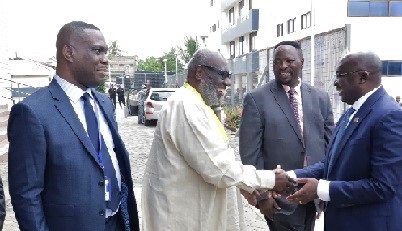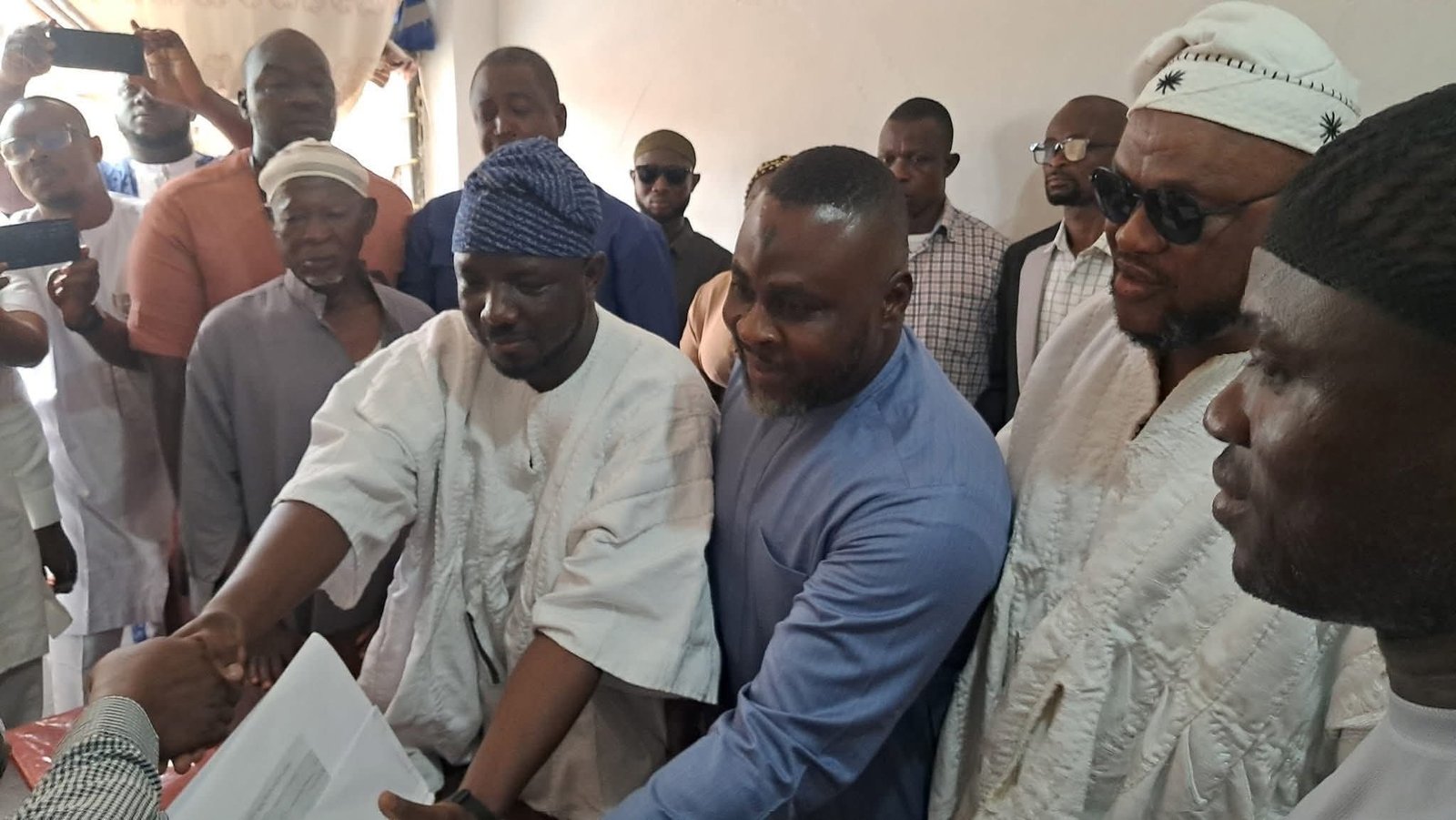Hot!
Ghana card database: 148,000 employees missing and multiple identities uncovered on payroll

Five hundred and thirty-three people on the Controller and Accountant-Generals Department (CAGD) payroll database have been found to have multiple identities.
In addition, 148,060 out of the about 601,000 employees on the database did not match any of the names on the national identification register, the Ghana Card database.
The Vice-President, Dr Mahamudu Bawumia, who made this known, said that was the outcome of the first phase of an exercise completed by the CAGD last week.
Addressing the opening of this year’s Internal Audit Conference organised by the Internal Audit Agency (IAA) in Accra yesterday, the Vice-President said the government would rely on the IAA to get to the bottom of the corruption associated with ‘ghost’ names on the government payroll.
The three-day conference, which is being attended by internal auditors from across the country, is on the theme: “Injecting fiscal discipline into resource mobilisation and utilisation for sustainable development: The role of internal auditors.”
“We were matching employees on the CAGD database with the Ghana Card ID and they completed the first phase last week. In all of cases of multiple identities, the employees have more than one CAGD’s accounts, with different employee numbers,” Dr Bawumia said.
“We are going to triangulate by checking from the Social Security and National Insurance Trust (SSNIT) biometric database to see how we can match all of these,” he added.
Corruption
The Vice-President said even if the 148,000 people on the CAGD database who had so far not matched anybody on the Ghana Card register had not yet registered for the Ghana Card, they should be paying SSNIT, since they were on the CAGD database.
“It is also possible that some of those without these matching biometrics could also have multiple employee accounts, but we have to see. I have heard of ‘ghost’ workers, I have never heard of ghosts who are twins or triplets,” Dr Bawumia said.
To cut waste from the compensation budget, he said, the government was also working with the IAA to eliminate ‘ghost’ workers from the government payroll.
In that regard, he said, all public institutions had been directed to submit headcount copies of their monthly salary validation report to the IAA and the CAGD by the 15th day of every month for validation.
He said the IAA would, in turn, follow up on those reports and authenticate the existence of the staff and connect their productivity to the remuneration being paid by the government.
Through that, the Vice-President explained, the government was taking steps to save a lot of money from ‘ghost’ names and pursue those who did not work but got paid.
These and other strategic measures adopted by the government, he said, were to ensure fiscal discipline in the financial systems of the country and anchor economic sustainability.
Revenue mobilisation
As part of revenue mobilisation efforts, the Vice-President said the government was embarking on key reforms, including widening the tax net to increase tax revenue.
“The holistic digitalisation of the public sector service delivery of key institutions, as well as working to develop an audit information management system for internal auditors across the country, is a measure to seal loopholes, prevent corruption and enhance value for money in public spending,” he said.
Internal auditors
Touching on the role of internal auditors, Vice-President Bawumia said their preventive role across the public sector had enhanced fiscal discipline and saved the nation millions of cedis.
He said by their advice and vigilance, public sector waste and abuses had been minimised, while annual infractions reported by the Auditor-General had seen some level of decline between 2019 and 2020.
Dr Bawumia said the government would continue to restructure and reposition public sector internal audit as an important public financial management institution to put public officers on their toes towards observing fiscal discipline in spending public funds.
Going forward, he said, all internal auditors would be brought under the management, administrative and technical control and supervision of the new Internal Audit Service (IAS).
“The bill to establish the IAS has been developed and will be considered by Parliament soon. If we are able to resource internal auditors well, external auditors will have nothing or less to report on.
“So if I were the head of any government entity, I would err on the side of caution and apply the preventive approach to corruption by resourcing internal auditors to enable them to give of their best,” Vice-President Bawumia pointed out.
Payroll cleaning
The Director-General of the IAA, Dr Eric Oduro Osae, said the IAA, working through its internal auditors, had ensured that payroll fraud, ‘ghost’ names, unnecessary expenditure and waste in the public sector payroll were being reduced gradually.
To that end, he said, the IAA was collaborating with the CAGD, under the umbrella of the Ministry of Finance, to clean up the payroll on a monthly basis.
Office allocation
Dr Osae commended the government for allocating an office to the agency.
He said the passage of the Internal Audit Service Bill would bring all internal auditors under a single unit to properly position the agency to fight corruption.
He appealed for the rationalisation of the salaries of internal auditors, particularly those with metropolitan, municipal and district assembles (MMDAs), adding that if the government wanted to fight corruption, it must resource internal auditors.
Moral values
The Chairperson for the conference, Prof. Olivia A.T. Frimpong Kwapong, stressed the need to inculcate moral values in both adults and the younger generation in relation to money.
“If we are able to contain that and are content to live within our means, we can be sure of fiscal discipline among all stakeholders for sustainable development,” she said.
Source: www.graphic.com.gh
Hot!
Prof Alidu Seidu files nomination for Tamale Central seat

The newly elected parliamentary candidate of the National Democratic Congress (NDC) for Tamale Central, Prof Alidu Seidu, has submitted his nomination forms to the Electoral Commission.
As of 10:00 a.m. today, he was the only person who had filed to contest the seat.
Nomination of candidates will close at the end of the day.
Associate Professor and Head of the Political Science Department at the University of Ghana Legon, Prof. Alidu Seidu won the National Democratic Congress (NDC) parliamentary primaries in the Tamale Central constituency with a landslide victory.
The elections, supervised by the party’s Elections and IT Directorate in the Northern Region, saw Prof. Seidu poll 840 votes out of the total valid ballots cast.
His closest contender, Lawyer Hanan Gundadow Abdul-Rahaman, secured 536 votes.
The other aspirants could not make significant gains, with Dr. Seidu Fiter obtaining 44 votes, Aliu Abdul-Hamid 23 votes, and the rest recording fewer than 10 votes each.
In all, 1,500 ballots were cast, with 6 ballots rejected and 7 spoilt ballots recorded.
The results were signed and declared by Dr. Arnold Mashud Abukari, NDC Northern Regional Director of Elections and IT.
The National Democratic Congress (NDC) held parliamentary primaries in Tamale Central to choose a candidate for the upcoming by-election following the death of the sitting Member of Parliament, Dr. Ibrahim Murtala Mohammed. Dr. Mohammed, who also served as Minister for Environment, Science, Technology and Innovation, tragically died in a military helicopter crash in the Adansi Akrofuom District on August 6, 2025, alongside seven others.
His passing left the Tamale Central seat vacant, as required by Ghana’s 1992 Constitution.
The Electoral Commission has scheduled the by-election for September 30, 2025. While the NDC moved quickly to open nominations and vet aspirants, the New Patriotic Party (NPP) announced it would not contest the seat, citing the need to respect the somber circumstances and promote national unity.
By: Jacob Aggrey
Hot!
Ghana to locally refine its gold starting October 2025 – Sammy Gyamfi

The Chief Executive Officer of the Ghana Gold Board, Sammy Gyamfi, has announced that plans are far advanced for the establishment of a state-owned gold refinery in the country.
Speaking at the 2025 Minerals and Mining Convention, Mr Gyamfi said the refinery will process locally mined gold into bullion instead of exporting it in its raw state.
According to him, it is unacceptable that Ghana, despite being a leading gold producer in Africa, continues to export raw gold known as dore.
He explained that the Gold Board, working with the Bank of Ghana and local refineries, will from October 2025 begin refining gold locally.
He also disclosed that an ultramodern assay laboratory will be built to ensure international standards in testing gold quality.
Mr Gyamfi noted that the refinery will be wholly state-owned and will help Ghana move away from raw mineral exports to value addition.
This, he said, will boost foreign exchange earnings, create jobs, and position Ghana as a hub for gold refining and jewellery production in Africa.
The CEO stressed that the project forms part of government’s strategy to ensure the country benefits fully from its natural resources and to transform the mining sector into a driver of economic growth.
By: Jacob Aggrey






